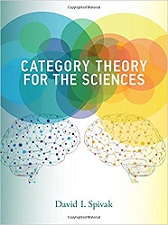
|
FreeComputerBooks.com
Links to Free Computer, Mathematics, Technical Books all over the World
|
|
- Title: Category Theory for the Sciences
- Author(s) David I. Spivak
- Publisher: The MIT Press; 1 edition (October 10, 2014)
- License: Attribution-Noncommercial-Share Alike 3.0
- Hardcover: 496 pages
- eBook: HTML, PDF, ePub, Mobi (Kindle), etc.
- Language: English
- ISBN-10/ASIN: N/A
- ISBN-13: 978-0262028134
- Share This:

|
Category Theory was invented in the 1940s to unify and synthesize different areas in mathematics, and it has proven remarkably successful in enabling powerful communication between disparate fields and subfields within mathematics.
This book shows that category theory can be useful outside of mathematics as a rigorous, flexible, and coherent modeling language throughout the sciences. Information is inherently dynamic; the same ideas can be organized and reorganized in countless ways, and the ability to translate between such organizational structures is becoming increasingly important in the sciences.
Category theory offers a unifying framework for information modeling that can facilitate the translation of knowledge between disciplines. Written in an engaging and straightforward style, and assuming little background in mathematics, the book is rigorous but accessible to non-mathematicians.
Using databases as an entry to category theory, it begins with sets and functions, then introduces the reader to notions that are fundamental in mathematics: monoids, groups, orders, and graphs -- categories in disguise. After explaining the "big three" concepts of category theory -- categories, functors, and natural transformations -- the book covers other topics, including limits, colimits, functor categories, sheaves, monads, and operads.
The book explains category theory by examples and exercises rather than focusing on theorems and proofs. It includes more than 300 exercises, with solutions.
This book is intended to create a bridge between the vast array of mathematical concepts used by mathematicians and the models and frameworks of such scientific disciplines as computation, neuroscience, and physics.
About the Authors- David I. Spivak is a research scientist in the mathematics department at MIT. His current research is on Categorical Informatics, i.e. using category theory to study information as it is used in the world. Previous research subjects include Derived Manifolds, Infinity categories (a.k.a. quasi-categories), and Physics.
- Category Theory
- Applied Mathematics
- Graph Theory
- Algebra, Abstract Algebra, and Linear Algebra, etc.
- Functional Programming and Lambda
- Database Theory and Systems

- Category Theory for the Sciences (David I. Spivak)
- The Mirror Site (1) - PDF
- 2013 Edition - PDF (267 pages) [Mirror]
-
 Computational Category Theory (David E. Rydeheard,, et al.)
Computational Category Theory (David E. Rydeheard,, et al.)
This book is an implementation of concepts and constructions from category theory in the functional programming language Standard ML. It it proceeds from algorithm to algorithm until all of elementary category theory is laid out in precise computational form.
-
 Category Theory for Programmers (Bartosz Milewski)
Category Theory for Programmers (Bartosz Milewski)
In this category theory for programmers, the author illustrates all major concepts using computer code. You are probably aware that functional languages are closer to math than the more popular imperative languages. They also offer more abstracting power.
-
 Category Theory: A Programming Language Oriented Introduction
Category Theory: A Programming Language Oriented Introduction
This book explains the following topics: Categories, functors, natural transformations, String diagrams, Kan extensions, Algebras, coalgebras, bialgebras, Lambda-calculus and categories.
-
 Category Theory for Computing Science (Michael Barr, et al.)
Category Theory for Computing Science (Michael Barr, et al.)
This book is a textbook in basic category theory, written specifically to be read by people in computing science. It expounds the constructions we feel are basic to category theory in the context of examples and applications to computing science.
-
 An Invitation to Applied Category Theory: Seven Sketches
An Invitation to Applied Category Theory: Seven Sketches
Category theory is now a powerful tool in science, informatics, and industry. This book offers a self-contained tour of applied category theory. Each chapter follows a single thread motivated by a real-world application and discussed with category-theoretic tools.
-
 Topology: A Categorical Approach (Tai-Danae Bradley, et al)
Topology: A Categorical Approach (Tai-Danae Bradley, et al)
A graduate-level textbook that presents basic topology from the perspective of category theory. Many graduate students are familiar with the ideas of point-set topology and they are ready to learn something new about them.
-
 Basic Category Theory (Tom Leinster)
Basic Category Theory (Tom Leinster)
Assuming little mathematical background, this short introduction to Category Theory is ideal for beginning graduate students or advanced undergraduates learning category theory for the first time.
-
 Category Theory in Context (Emily Riehl)
Category Theory in Context (Emily Riehl)
This book introduces the essential concepts of category theory: categories, functors, natural transformations, the Yoneda lemma, limits and colimits, adjunctions, monads, Kan extensions, and other topics.
-
 Categories, Types, and Structures (Andrea Asperti, et al)
Categories, Types, and Structures (Andrea Asperti, et al)
This book introduces Category Theory at a level appropriate for computer scientists and provides practical examples in the context of programming language design. It pursues the more complex mathematical semantics of data types and programs.
-
 Categorical Homotopy Theory (Emily Riehl)
Categorical Homotopy Theory (Emily Riehl)
This book develops abstract homotopy theory from the categorical perspective with a particular focus on examples. It helps consolidate and simplify one's understanding of derived functors, homotopy limits and colimits, and model categories, among others.
-
 Higher Topos Theory (Jacob Lurie)
Higher Topos Theory (Jacob Lurie)
This book presents the foundations of Higher Topos Theory, using the language of weak Kan complexes, and shows how existing theorems in algebraic topology can be reformulated and generalized in the theory's new language.
-
 Programming in Martin-Lof's Type Theory: An Introduction
Programming in Martin-Lof's Type Theory: An Introduction
This book focuses on the type theory developed by Per Martin-Lof. It contains a thorough introduction to the Martin-Lof's Type Theory, with information on polymorphic sets, subsets, monomorphic sets, and a full set of helpful examples.





